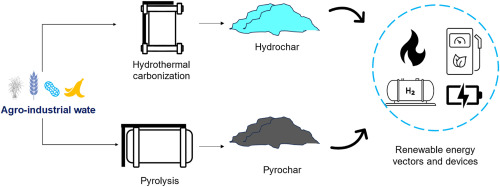
New paper on biogenic carbon in renewable energy vectors and device
New paper ‘Application of biogenic carbon in renewable energy vectors and devices: A step forward to decarbonization’ written by MaREI researchers Kunwar Paritosh and Archishman Bose from ERI at University College Cork.
Abstract
The world is moving towards decarbonization, as rapid industrialisation and population increase have increased carbon emissions in the last decades. According to the Intergovernmental Panel on Climate Change, the CO2 emissions from human activities reached an unprecedented peak of 10 x 109 GtCO2e from 2010 to 2019. To reduce the dependency on fossil fuels for energy security, renewable energy carriers (such as biomethane, biodiesel, and biohydrogen) and devices (like batteries, supercapacitors, and microbial fuel cells) are being explored as an alternative to fossil fuel incumbents. However, the materials and catalysts employed in producing and fabricating these energy carriers and devices are typically either fossil-based or economically unviable. The production and performance of these energy carriers and devices may be improved using pyrochar and hydrochar derived from agro-industrial wastes. Agro-industrial wastes are rich in carbon which may be valorised as pyrochar and hydrochar for various applications. This critical review presents the importance of pyrochar and hydrochar as a material and catalyst for renewable energy vectors and devices along with limitations and further research directions for technological advancement.

You can read the full paper here.




